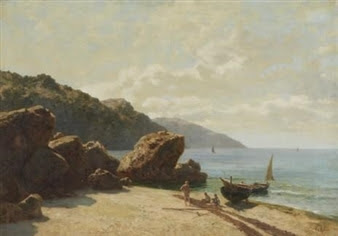Most likely, Chopin finished the Ballade No. 2 in Majorca, while staying there in the company of George Sand and her children, in the winter of 1838-39. Or perhaps he only took care of its revision. In a letter to his friend Fontana, dated January 1839, Chopin tells him that he is sending the Ballade to Camille Pleyel, his publisher in Paris, along with a good batch of other pieces, the complete Preludes among them.
A hesitant dedication
It is well known that the work is dedicated to Robert Schumann, in retribution for the German composer's dedication to Chopin of his Kreisleriana, completed a few months earlier. Less known is that Chopin never played the work of his colleague, whose output he was reticent about, even though the generous Schumann spared no praise for almost all of Chopin's oeuvre for many years.
And truth be told, the purpose of dedicating the ballade to Schumann does not appear at all categorical or unrenounceable, as we read later in the letter to Fontana, already mentioned:
"[...] I would like my Preludes to be dedicated to Pleyel, and my Second Ballade to Schumann. Now, if Pleyel does not want to give up the dedication of the Ballade, then dedicate the preludes to Schumann..."
R. Schumann (1810 - 1856)
And the trade-off may have been for the better, for while Schumann greeted the Ballade No. 1 with fervent enthusiasm, he was somewhat less enthusiastic about the Second, which he found a bit "less artistic".
All in all, what has been pointed out should not be understood as Chopin's dislike of Schumann (which would be, on Chopin's part, at least an extravagance). It is simply that, as creators, the two artists were at antipodes, even if they were strictly contemporaries.
 |
| Chopin, young. A painting by Ary Scheffer |
And they truly were at the antipodes, if we recall that for Chopin music was only music, unlike Schumann, who could find inspiration for musical creation in poetry. However (the perennial contradiction of a creative soul) Chopin confessed to his friend and ardent commentator that in composing the four Ballades he had taken inspiration from the reading of poems by his compatriot Adam Mickiewicz.
The "source"
For Ballade No. 2, the source poem is "Switez," which tells the story of Polish maidens from a besieged city who, to avoid falling prey to their captors, sink into the earth surrounding a lake. Turned into mysterious flowers, they adorn its shores ever since.
The piece is built on the alternation of two themes, one idyllic and the other a tempestuous burst of rapid arpeggios. The final bars evoke young girls turned into flowers.
The rendition is by the brilliant Chinese pianist Yundi Li, the youngest winner of the International Chopin Competition, in 2000, at the age of 18.


No comments :
Post a Comment